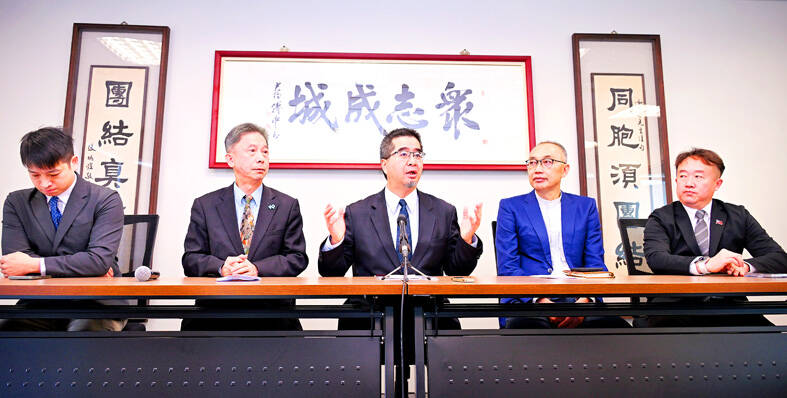The Chinese Nationalist Party (KMT) and the Taiwan People’s Party (TPP) yesterday failed to agree on a joint candidate for president, once again throwing into doubt their ability to unseat the ruling party in January’s election.
The parties were expected to announce an agreed-upon candidate yesterday at 10am, but instead announced that they needed further consultations after a disagreement over how to use polling data to make the selection.
On Wednesday, they reached an agreement to have poll experts selected by the KMT and the TPP assess the results of an aggregate of public polls released from Nov. 7 to Friday, along with internal polls conducted by the two sides to determine which of the two parties’ candidates has the best chance of winning the Jan. 13 election.

Photo: Fang Pin-chao, Taipei Times
After more than five hours of negotiations through Friday night, the two sides could not reach an agreement over which polls to consider and how large the margin of error should be.
TPP Chairman and presidential candidate Ko Wen-je (柯文哲) had agreed that if he came out ahead in the polling results, but his lead was within a margin of error, he would count that as a win for New Taipei Mayor Hou You-yi (侯友宜), the KMT’s presidential candidate.
The KMT and the TPP insist their reading of the polls is the correct one, with the KMT’s showing that if Hou was the presidential candidate then the joint team with Ko as running mate would beat Vice President William Lai (賴清德), the Democratic Progressive Party’s (DPP) presidential candidate, which is not what the TPP’s shows.
As of yesterday, the parties were still unable to agree on how to interpret the polling data and whether landline-only polls should be used.
Nevertheless, the two sides have not relinquished hope of collaborating for the election, with Ko and KMT Chairman Eric Chu (朱立倫) telling separate news conferences that they would continue negotiating ahead of the deadline on Friday next week for candidates to register with the Central Election Committee.
Regarding whether talks had broken down for good, former Taipei mayor Ko, who has previously said that the things he hates the most are “mosquitoes, cockroaches and the KMT,” yesterday said that anything was possible before Friday next week, but he could not be expected to “surrender” to the KMT on the poll issue.
“We hope we can continue to consult with the KMT,” he said.
Chu told a separate news conference that cooperation remained the aim, but did not indicate he would back down on the polls issue.
“We hope to reach consensus as soon as possible,” he said.
Meanwhile, Ko and Hou individually trail in the polls with Lai as the frontrunner.
A fourth candidate, Hon Hai Precision Industry Co (鴻海精密) founder Terry Gou (郭台銘), has thrown his hat in the ring as well.
The DPP, which many have speculated would tomorrow announce Representative to the US Hsiao Bi-khim (蕭美琴) as Lai’s running mate, said that only China stands to gain from the KMT and TPP aligning.

SECURITY: As China is ‘reshaping’ Hong Kong’s population, Taiwan must raise the eligibility threshold for applications from Hong Kongers, Chiu Chui-cheng said When Hong Kong and Macau citizens apply for residency in Taiwan, it would be under a new category that includes a “national security observation period,” Mainland Affairs Council (MAC) Minister Chiu Chui-cheng (邱垂正) said yesterday. President William Lai (賴清德) on March 13 announced 17 strategies to counter China’s aggression toward Taiwan, including incorporating national security considerations into the review process for residency applications from Hong Kong and Macau citizens. The situation in Hong Kong is constantly changing, Chiu said to media yesterday on the sidelines of the Taipei Technology Run hosted by the Taipei Neihu Technology Park Development Association. With

CARROT AND STICK: While unrelenting in its military threats, China attracted nearly 40,000 Taiwanese to over 400 business events last year Nearly 40,000 Taiwanese last year joined industry events in China, such as conferences and trade fairs, supported by the Chinese government, a study showed yesterday, as Beijing ramps up a charm offensive toward Taipei alongside military pressure. China has long taken a carrot-and-stick approach to Taiwan, threatening it with the prospect of military action while reaching out to those it believes are amenable to Beijing’s point of view. Taiwanese security officials are wary of what they see as Beijing’s influence campaigns to sway public opinion after Taipei and Beijing gradually resumed travel links halted by the COVID-19 pandemic, but the scale of

A US Marine Corps regiment equipped with Naval Strike Missiles (NSM) is set to participate in the upcoming Balikatan 25 exercise in the Luzon Strait, marking the system’s first-ever deployment in the Philippines. US and Philippine officials have separately confirmed that the Navy Marine Expeditionary Ship Interdiction System (NMESIS) — the mobile launch platform for the Naval Strike Missile — would take part in the joint exercise. The missiles are being deployed to “a strategic first island chain chokepoint” in the waters between Taiwan proper and the Philippines, US-based Naval News reported. “The Luzon Strait and Bashi Channel represent a critical access

Pope Francis is be laid to rest on Saturday after lying in state for three days in St Peter’s Basilica, where the faithful are expected to flock to pay their respects to history’s first Latin American pontiff. The cardinals met yesterday in the Vatican’s synod hall to chart the next steps before a conclave begins to choose Francis’ successor, as condolences poured in from around the world. According to current norms, the conclave must begin between May 5 and 10. The cardinals set the funeral for Saturday at 10am in St Peter’s Square, to be celebrated by the dean of the College